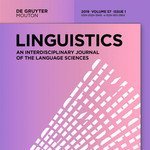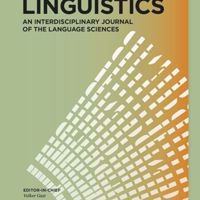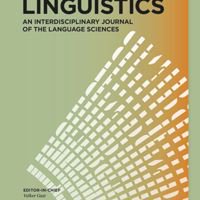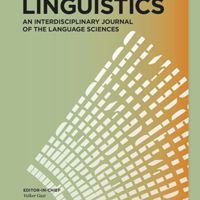
Linguistics (journal)
@LinguisticsJ
Followers
2K
Following
37
Media
34
Statuses
115
An Interdisciplinary Journal of the Language Sciences. This account is maintained by the Editor-in-chief
Joined August 2019
RT @ChaseWRaymond: New paper on non-restrictive ‘which’-clauses, with Rebecca Clift — just out in @LinguisticsJ!
0
17
0
Here's a third paper from the special issue edited by Marina Terkourafi on 'Ethics in Linguistics', by Sarah Atkins, Jai Mackenzie and Lucy Jones. It deals with participant-centred linguistic research (PCLR),
degruyterbrill.com
This article outlines ethical principles for ‘participant-centred linguistic research’ (PCLR), a term we coin to incorporate a range of linguistic research approaches that place importance on the...
0
5
18
Here's a second paper from the special issue on 'Ethics in Linguistics'. E. Dalmaijer, @wyke_stommel , B. Pas and W. Spooren discuss "Ethical challenges in collecting pre-existing digital data for linguistics".
degruyterbrill.com
Pre-existing digital data are a valuable resource for linguistic research. Collecting these materials is often thought of as straightforward (“the data exist anyway”) and ethical dilemmas are given...
0
3
7
We are looking forward to a forthcoming special issue on 'Ethics in linguistics', ed. by M. Terkourafi. Here's a first paper by H. Sarvasy, published ahead of print and Open Access, on 'Ethical budgets in (psycho-)linguistic fieldwork'
degruyterbrill.com
As most linguists and social scientists are now aware, cross-cultural field research can be extractive, especially when the target community does not have ready access to and/or understanding of the...
1
5
21
Here's an interesting piece on the grammaticalization of 'like'/'love' as habitual markers in MESA languages (Chinese, Thai, Lao, Vietnamese, Khmer, Burmese), by Hongmei Fang (e.g. 'The internet likes to break down'):
degruyterbrill.com
This paper documents the common grammaticalization path of the LIKE/LOVE constructions into expressing habitual aspect in Mainland East and Southeast Asian languages. The stages and degrees of...
0
21
53
Historical evidence on the syntactic status of “No”, by P. Wallage and W. van der Wurff: “Put not your trust in princes nor in any child of man, for there is no help in them. No is? Sure some help there is, some little help in them . ”
degruyterbrill.com
This paper addresses the analysis of sentence fragments, specifically the English negative polar response item no . Two main types of synchronic analysis have been proposed for present-day English –...
0
6
9
Interesting study of the Nakh-Daghestanian language Andi, by S. Kayne: adverbs agree with a controller with absolutive case.
degruyterbrill.com
Andi (Nakh-Daghestanian; Russia) displays a typologically remarkable phenomenon: adverbs of numerous morphological and functional types inflect for agreement with a clause-level controller. To the...
1
7
30
RT @BarElitzur: Happy to share a new study in @LinguisticsJ that explores how language changes over time through the process of reanalysis….
0
2
0
Experimental evidence on NC versus NPI constructions in English. Stephanie Rotter and Mingya Liu show that there is a register effect in American English.
degruyterbrill.com
Negative concord (NC) is used in many English varieties but usually considered ungrammatical in ‘standard’ contemporary English, where negative polarity items (NPIs) are used. In this paper, we take...
0
4
16
In her new Linguistics article Raina Heaton provides novel experimental evidence on the use of the Agent focus construction in the #Mayan language Kaqchikel, with interesting theoretical implications regarding processing economy and discourse pressures
degruyterbrill.com
This study provides new data on the use of agent focus (AF) versus transitive constructions in Kaqchikel. This work follows up on a study done by Heaton et al. (Heaton, Raina, Kamil Deen & William...
0
9
20
V2 word order is well-known from Germanic languages, but not everybody knows that it also existed in Medieval French. Its distribution is determined by register though, see the recent study by P. Larrivée
degruyterbrill.com
Quantitative studies of V2 in Medieval French have produced diverging results with respect to the rate of use of V2 and the informational value of the initial XP. These divergences are hypothesized...
0
8
28
New paper on corpus building for sign languages (FinSL), using a novel interview method to add ethnographic data to the original corpus, by @Anmapuup , G. Hodge, @bananabull, @JuhanaSalonen, T. Wainio, @Jarkko_Keranen, D. Hernández and @tommijantunen.
0
9
21
Here's another publication on sign languages: @CindyvanBoven3 on predicate reduplication in Sign Language of the Netherlands (NGT) and its role in aspect marking. #OpenAccess #SignLanguages
degruyterbrill.com
This study investigates the use of predicate reduplication to express aspectual meaning in Sign Language of the Netherlands (NGT). The study focuses on three aspect types that have been found to be...
0
5
9
From gesture to sign: A study of conventionalization in the gestural repertoire of non-signers, by V. Janke, L. Aumônier , J. Hofweber, M. Gullberg and @ChloeRuMarshall #OpenAccess
0
24
47
Exciting work by Tekabe Legesse Feleke on the representation of (Eastern and Western) dialects in speakers of Oromo, using evidence from gender inflection:
degruyterbrill.com
The extent to which the grammar of one dialect influences the grammar of another and the mechanisms that bidialectal speakers employ to distinguish a target grammar from non-target grammar have not...
0
6
15
An experimental study of multilingualism and language contact in two #Mande languages spoken in Guinea, by M. Khachaturyan, G. Moroz and P. Many:
2
9
25











